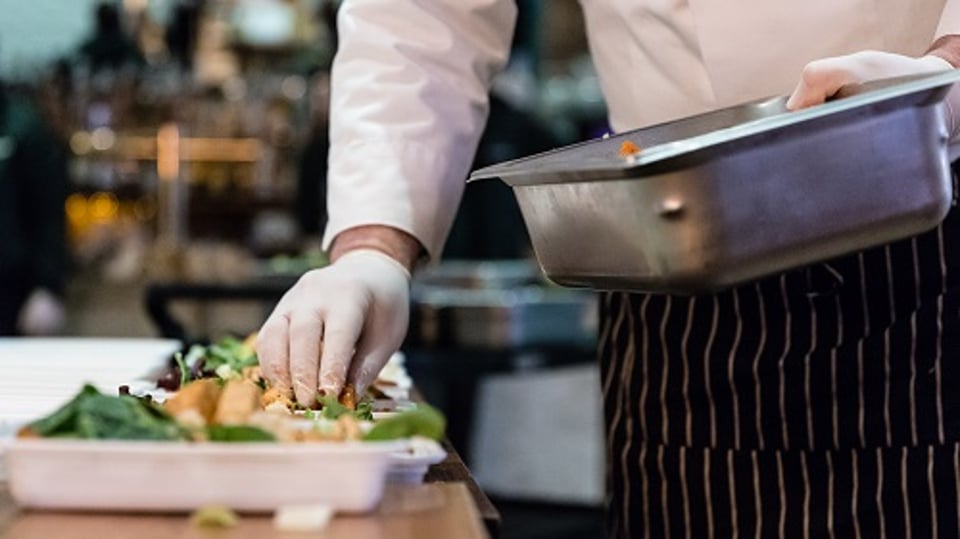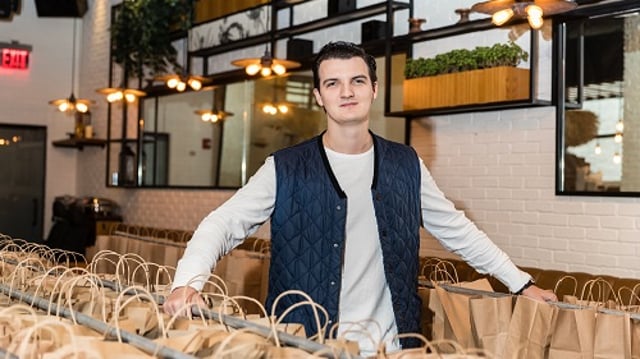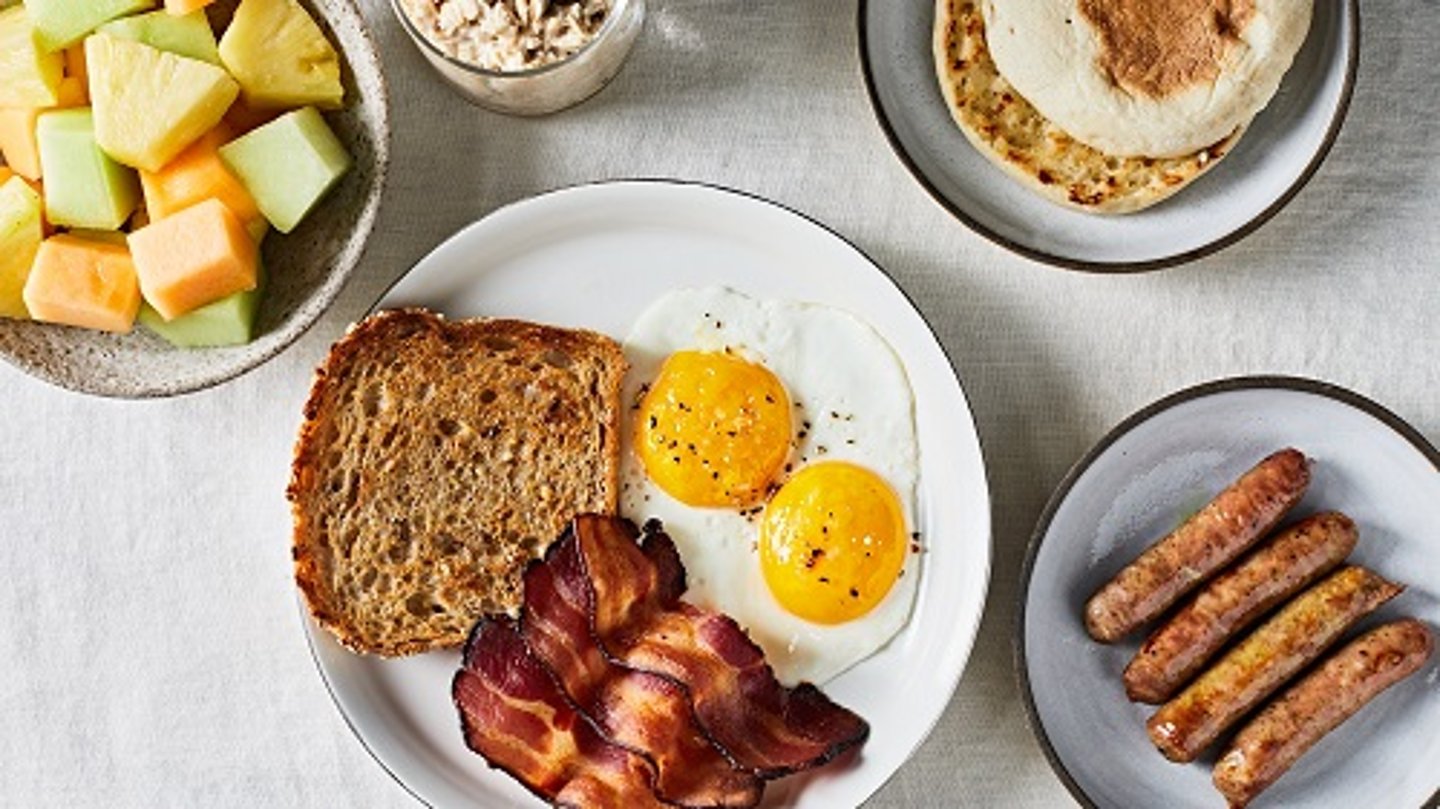Ghost Kitchen for Hotels Expands to DC
Hospitality Technology’s Anna Wolfe recently caught up with Tim Gjonbalic, Founder & CEO of Butler Hospitality, a ghost kitchen for hotels specializing in virtual room service and catering for hotels. Just last month, Butler Hospitality began providing services to the 150+ rooms at the Canopy By Hilton Washington DC Embassy Row.
After years of restaurant experience under his belt, Gjonbalic launched Butler Hospitality in 2016 as an inventive way to take over and operate underutilized hotel kitchens to produce delicious food and exceptional guest experiences. Butler delivers on-demand room service to surrounding hotels in under 30 minutes and works with 100+ hotels (IHG, Hilton, Marriott, etc.) and more than 20,000 rooms. The New York-based company is planning further city expansion in Chicago and Miami.
Hospitality Technology: Would you tell us how the idea came about for Butler Hospitality?
Tim Gjonbalic, Founder & CEO of Butler Hospitality: I grew up in the back of kitchens. My parents came to this country in the early nineties from the former Yugoslavia. I got into the restaurant space at 12. [Since I was] first generation, you're pulling permits, you're applying for applications, you're translating docs. So, I got the unfair advantage of getting started very early. ...There was a DoubleTree Hilton being built in the financial district in New York. And we threw our hat in the ring, and I ended up taking over a hotel restaurant and running that as a restaurateur. It was really during that experience that I learned just how inefficient a lot of these (restaurants) were being run...Hotels, brands and owners were figuring out how to minimize the burn instead of trying to understand how to build that experience to actually make it worthwhile for their guests and themselves. Being successful in the restaurant space. I said, ‘I know, I can do this. I can reinvent what it means .. to be a part of these hotels and reinvent that experience and actually deliver a quality experience to guests, agnostic of brands. At the end of 2018, we ended up raising venture capital and I'm doing it at a more meaningful scale.
What I was able to do successfully was leverage the hotel guests and leverage the locals in order to build an experience. Dining at the DoubleTree Hilton is usually not the most glamorous thing. But we made it glamorous because we built an experience. … We asked: What if we just focused on food and beverage and reinventing that experience? We had to build the technology component because you have all of these disparate systems that exist at the property level that don't watch guest data ... to deliver the best guest experience. We had to provide an omni-channel approach to ordering (via the phone, the web, via voice and off the TV, to name a few.)
Hotels don't have a selling problem, rather they have a buying problem. How do we make it easier for guests to get what they want in their world? Guests wake up, they want to have a cup of coffee. They want a quality breakfast in-room. They really want to have these experiences, and our job is just to make it easier and better and higher quality. The only way for us to do this is if we actually control the kitchen, cook the food, design the menu, figure out the brand, then also do the logistics and build the technology for guests to [use to] order. We're truly lucky that we get to touch every single piece of the experience.
HT: Absolutely. Please tell us a little bit about your tech stack that you've created to make this work.
Gjonbalic: So, we have both the digital and the physical product, which is awesome and also very challenging. For the physical product, we have dining room and dining concepts that we implement and we have a room service product, which is our delivery logistics play, which allows us to interact with guests as they check in and basically communicate to the guest during their stay and provide them with anything from amenities to packages, to in-room dining. Vouchers is a good example of that. And then catering, which is both on-demand and will be called ‘food as a service.’ (For example, the Hampton Inn wants breakfast delivered every day.)
In terms of the digital product, we have a mix between building proprietary tech and then beyond that, building the pipes to the PMS. Is your POS and your reservation management system aggregating all of the disparate kinds of guest data that sits within each one of those platforms? And connecting to that, to really understand what the guests want during their stay and how can we build a better experience by meeting them and anticipating their orders.
HT: Can you give an example?
Gjonbalic: A great example of that on the B2B side is we have a hotel portal. Hotels have an inventory problem every day; they're trying to sell all of their inventory. And our job is to build technology that allows them to bundle breakfast, to include a voucher, to bundle an amenity and really continue to drive that ADR and to add those cherries on top. The hotel portal is utilized by the front desks to generate digital vouchers, so they're not handwriting vouchers anymore. They're texting it to guests that check in, so that guests can stop in the restaurant and scan their voucher. They can order on the web and submit their voucher code; they don't have to say, ‘I forgot my voucher in my room.’ It's really just for experience and our ability to understand. Connecting the POS and PMS to the reservation system allows us to [observe their buying habits and] continue to add value by almost anticipating what they're going to want.
[For example, communicating to guests:] “We're doing last call, we know that you've got $20 left on your per diem. Would you like a glass of wine sent up to your room?” That is really just meeting the guests where they work, where they are. And that has been our goal. We've got a ton of logistics play on the backend in terms of batching orders and getting really smart...The type of data we collect allows us to batch orders, be smarter with logistics and allow for pre-ordering.
HT: For the food as a service component of your model, to deliver those orders, are you using a proprietary solution or are you using a white label delivery product through a third-party delivery service?
Gjonbalic: No, we actually built our own logistics software on the backend. We actually batch our own orders. We think about routing efficiencies. In terms of the actual delivery personnel, they are our full-time employees. We employ everyone at the kitchens, all of the delivery staff are our personnel. They're the only ones allowed to go directly to the hotel room and directly into the building. Knock three times on your door, allow you to sign off on a tablet and get a charge directly to your folio. So we are really an end- to-end experience and we control the entire mile.
We're nothing like the DoorDashes or Ubers in terms of leveraging the gig economy. We are actually taking care of our people and employing our folks because they touch our guests. It's important. Right?
[SURVEY: Contactless is Here to Stay]
HT: Absolutely. Happy employees give the best service. We all know that hiring and finding employees is and has been a real challenge. I would think that hotel operators are looking at concepts like yours to help them gain more efficiency. And also just to relieve that part of the business, so they can focus on delivering service and other other areas.
Gjonbalic: Absolutely. One of the greatest things we get to do is to craft and design that ‘new normal.’ What does it look like? How would guest behavior change? And what does the future look like for us? We always have this thesis: It could be better. The smart hotel owners and brands are going to look for partners like Butler in order to build that experience. We come in and we add value and take away a loss leader. And we pay them a commission ... For the employees we take them on and we're able to provide benefits and growth opportunities within the market instead of just one single hotel. That has allowed us to be successful with the type of people we're hiring on the ground. One, we're hiring folks that want to be a part of a hotel organization. It has a lot of value for folks that want stability and want to be a place where they can grow… We see more success within our own referral network of employees than any other channel… It has absolutely been a huge referral network. I think people really believe in what we're doing and the fact that we actually deliver on what we say has been a big motivator for folks to bring in their own networks.









